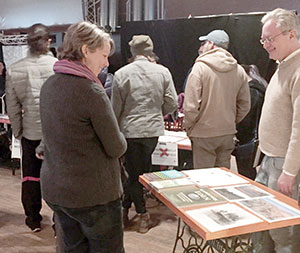By Haley ED Houseman

A very receptive audience turned out to view the screening of the climate change documentary “This Changes Everything” that played at Arts at the Armory last Sunday.
This Changes Everything, is a climate change documentary based on a book by Naomi Klein of the same name. Directed by Avi Lewis, the film sets up the same opposition in the book, that of positive climate action as directly in conflict with capitalism as it exists today. Telling the story in a series of vignettes set across the globe, the story captured the interest of attendees of the screening at Arts at the Armory on Sunday.
At its center, the documentary puts marginalized communities taking action at the forefront, often peoples who have longstanding relationships to the land and its rhythms. It frames the recent move toward globalism as both creating goods for the whole world and now polluting the whole world, often putting goods in the hands of the wealthy and pollution in the homes of the producers.
Setting up all governments, but particularly the world-leading US, as missing in action while the crisis looms, it traces the complex lines of power, capital and production that have positioned climate change as an unfixable collective action problem. But it is not all gloomy. Though the film presents a dire circumstance, it also presents sustainable alternatives that reveal ways in which development can complement rather than oppose climate action.
The documentary spans the many different activist campaigns, climate actions and lawsuits against both governments and companies. Within its span, it looks at a lawsuit filed by the Beaver Lake Cree Nation against the government of Canada, where First Nation people have been denied access to their lands amid reports of environmental contamination.
The documentary also struck closer to home with moving images of Hurricane Sandy in NYC, with Far Rockaway underwater. Volunteers of Occupy Sandy spoke to the utter lack of FEMA and Red Cross aid in the crisis, an underreported facet of the impact of climate changes and its related disasters. Afterwards, the film presents stories from Greece, from India, from China, even as it addresses the climate deniers of the Heartland Institute in the Midwest.
As people swarmed into the Amory’s gathering space, they stopped to sign in, moving briskly through the atrium. Nearly 150 people filled the space as volunteers pulled out extra seating. While there was a line to get in and sign in, “I had zero expectations,” said one organizer.
As they managed the line, volunteers seemed surprised and gratified by the turnout. “Maybe we should get another clipboard [for sign in] – Wow, there’s so many people!” The activist groups present lost no time in trying to get people involved, with tables set up to pass out information and present petitions for signing. Afterward, attendees lingered to connect and chat with the volunteer groups present.
The event was organized primarily by Fossil Free Somerville, who has been working for the past two years to encourage fossil fuel divestment in the city’s retirement investments, among other projects. Also represented at the screening was the group Somerville Climate Action, which plays a partnership and supporting role in many local climate initiatives. Most recently, they have focused on banning plastic bags in Somerville, a proposal that was voted on by the Board of Alderman with success (plastic bags will be banned by fall 2016). Other activist groups included 350 MA, Solarize Mass, Soil for Climate, Mass Energy, and Mothers Out Front.
Oliver Sellers-Garcia, director of Sustainability and Environment was also on hand to discuss the recent release of Somerville’s Greenhouse Gas Inventory (GHG) Report, which sets a baseline for the city’s emissions as they work to reduce the load produced by citizens and businesses. While below the national average per capita emissions in the US, there are considerations being taken to reduce specifically the high emitters owned or managed by the city going forward as ambitious target goals are set. Says Sellers-Garcia, “We need to think about transformational changes” to get the city and country we need to go in the future. The report, along with other environmental information, can be found on the Sustainaville initiative homepage: http://www.somervillema.gov/sustainaville/.















Don’t blame capitalism, blame yourself every time you drive a car, fly in a plane, buy fresh fruit in winter, or heat your home with fossil fuels. If you use fossil fuels (which includes everyone), you are complicit in climate change
This is exactly why we need the green line. Attend the meeting tonight!!
There is no issue before us that is of more importance at this time. Another reason to make sure that we have the right leadership in place as we deal with this problem.